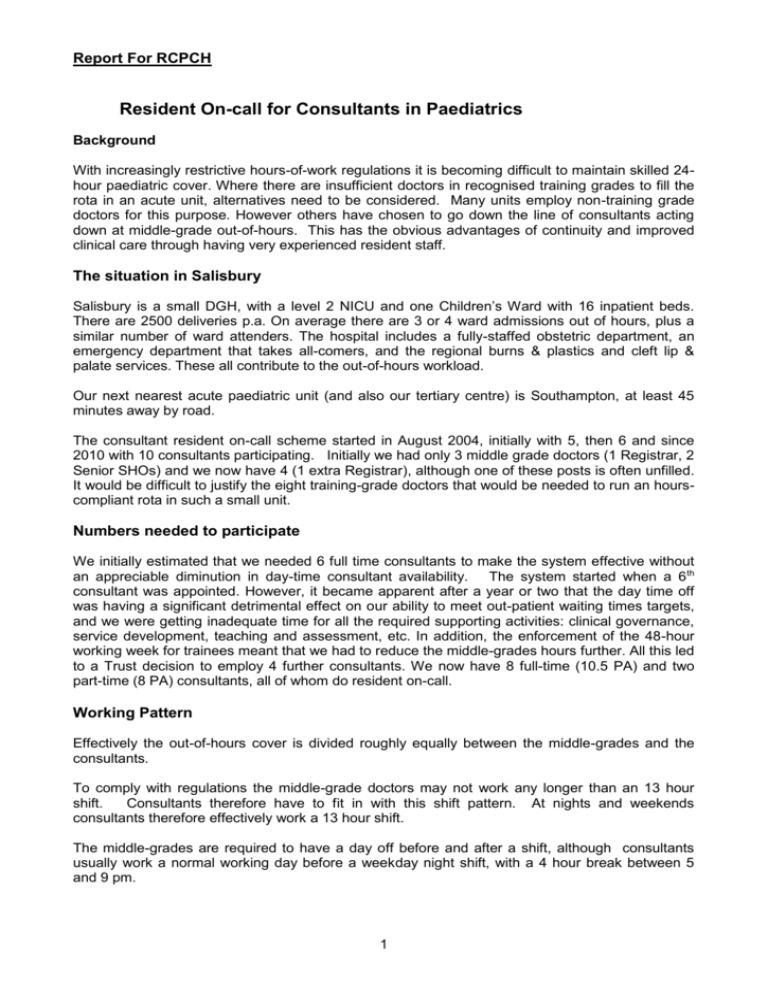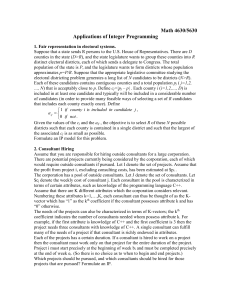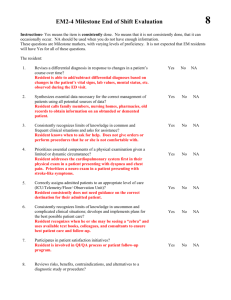Resident On-call for Consultants in Paediatrics
advertisement

Report For RCPCH Resident On-call for Consultants in Paediatrics Background With increasingly restrictive hours-of-work regulations it is becoming difficult to maintain skilled 24hour paediatric cover. Where there are insufficient doctors in recognised training grades to fill the rota in an acute unit, alternatives need to be considered. Many units employ non-training grade doctors for this purpose. However others have chosen to go down the line of consultants acting down at middle-grade out-of-hours. This has the obvious advantages of continuity and improved clinical care through having very experienced resident staff. The situation in Salisbury Salisbury is a small DGH, with a level 2 NICU and one Children’s Ward with 16 inpatient beds. There are 2500 deliveries p.a. On average there are 3 or 4 ward admissions out of hours, plus a similar number of ward attenders. The hospital includes a fully-staffed obstetric department, an emergency department that takes all-comers, and the regional burns & plastics and cleft lip & palate services. These all contribute to the out-of-hours workload. Our next nearest acute paediatric unit (and also our tertiary centre) is Southampton, at least 45 minutes away by road. The consultant resident on-call scheme started in August 2004, initially with 5, then 6 and since 2010 with 10 consultants participating. Initially we had only 3 middle grade doctors (1 Registrar, 2 Senior SHOs) and we now have 4 (1 extra Registrar), although one of these posts is often unfilled. It would be difficult to justify the eight training-grade doctors that would be needed to run an hourscompliant rota in such a small unit. Numbers needed to participate We initially estimated that we needed 6 full time consultants to make the system effective without an appreciable diminution in day-time consultant availability. The system started when a 6 th consultant was appointed. However, it became apparent after a year or two that the day time off was having a significant detrimental effect on our ability to meet out-patient waiting times targets, and we were getting inadequate time for all the required supporting activities: clinical governance, service development, teaching and assessment, etc. In addition, the enforcement of the 48-hour working week for trainees meant that we had to reduce the middle-grades hours further. All this led to a Trust decision to employ 4 further consultants. We now have 8 full-time (10.5 PA) and two part-time (8 PA) consultants, all of whom do resident on-call. Working Pattern Effectively the out-of-hours cover is divided roughly equally between the middle-grades and the consultants. To comply with regulations the middle-grade doctors may not work any longer than an 13 hour shift. Consultants therefore have to fit in with this shift pattern. At nights and weekends consultants therefore effectively work a 13 hour shift. The middle-grades are required to have a day off before and after a shift, although consultants usually work a normal working day before a weekday night shift, with a 4 hour break between 5 and 9 pm. 1 The most valuable day-time training opportunities for middle-grades occur Tues-Thurs. In order to allow middle-grades sufficient access to these, most of the mid-week nights are done by consultants. Weekends are shared equally. In practice, a day off is always taken after a resident night on call, and on certain other scheduled days. We are able to organise our clinic activities so that they are never scheduled following a resident night. When a consultant is working a resident shift, there is always a 3rd on backup consultant available from home, for the unusual occasions where 2 skilled people are needed at once. This happens not infrequently on weekend days, particularly when SHOs are new, but it is rare to be called at night when a consultant colleague is resident. The rota is of necessity quite complex. In practice, each consultant works about 1 resident weekday night per fortnight, and 2 sets of weekend shifts (either days or nights, Friday, Saturday and Sunday) every 20 weeks. When added to our normal on-call from home commitment, this equates to working at least part of 1 in every 5 weekends. Levels of activity when resident Most ward admissions are seen before midnight. The work-load for the resident consultant is therefore on the majority of nights not too arduous between about 1 am and 7am. It is unusual not to get at least a few hours sleep, albeit interrupted. Resident on-call is always with an SHO, but they may be quite junior. The level of activity is clearly busier every 6 months when the SHOs are new. Clinical care and training Children admitted out-of-hours undoubtedly benefit from receiving an immediate senior assessment, and this probably results in fewer unnecessary admissions. Unfortunately this is impossible to demonstrate numerically in the face of the general trend towards increasing admissions. SHOs (and nurses) find the quality of their out-of-hours training enhanced by a senior presence on the ward. Effect on day time service With adequate numbers of consultants, we found that starting to do resident on-call has not significantly increased outpatient waiting times. There are still roughly the same number of children passing through the outpatient department as before the scheme started. Time available for consultants for non-clinical activity during the day has diminished. In practice we find ourselves frequently doing admin, management and teaching tasks out of hours during our resident shifts. There is a ‘consultant of the week’ scheme for day-to-day continuity on the ward. The consultant of the week does not do any resident on-call that week, so they are always available during the day. Consultant Contract Resident on-call is worked strictly according to the 2003 Consultant Contract terms. All time spent as resident counts as time worked. Time spent as resident is between 7pm and 7am, and all day at weekends, is premium time (3 hours = 1 PA). 2 The arrangement is voluntary and subject to review. Accommodation Initially our sleeping accommodation was sub-standard but after prolonged negotiation with the Trust, we now have a very acceptable on-call flat, which is a reasonable distance from the acute areas and very comfortable. There is an ensuite bathroom and our own kitchen and sitting room. Affect on work-life balance We all appreciate having one or two week days off per week in compensation for doing the resident on call. After a busy night, some of this may be spent sleeping, but at other times we use it for pursuing other activities, either work-related or not. Consultants with young children appreciate the extra time they are able to spend with their families. Management issues Once the National Contract was negotiated, we had no difficulty in negotiating with our own Trust acceptable conditions for doing resident on call. The Trust management are very committed to maintaining 24-hour skilled paediatric cover in Salisbury. This service is seen as necessary to support the ‘flagship’ burns, plastics and cleft service in our Trust. Reconfiguring the acute paediatric service would be geographically and politically unacceptable, and at present there are no plans to do this. Recruitment Seven new consultant appointments have been made since we decided to operate in this way. It is notable that two of the successful appointees had worked in a similar scheme as locum consultants in Dorchester, and three others had seen it in action while working as registrars. They were not put off applying because of this. We have no way of knowing how many potential applicants who might have otherwise been interested were discouraged by the requirement to do resident on call. Situation in other Units In Dorchester and Basingstoke, a similar scheme started before us in Salisbury. Each of these units has a different rota system and different arrangements for remuneration and time off. I believe there are units in other parts of the country doing something similar but I have no information about this. (Contacts: Dorchester – Dr Phil Wyllie; Basingstoke – Dr Priya Ilangovan) Conclusion In spite of many people’s reservations, consultant residence on-call has worked successfully. This is largely due to the commitment of the consultants and local management. The implications for consultants’ life-style, and for sustaining the daytime service, have not been as adverse as expected. Reference: Scott-Jupp R. Consultants sleeping-in. BMJ Career Focus 2005;330:145-146 Dr Robert Scott-Jupp Consultant Paediatrician Salisbury District Hospital 3




